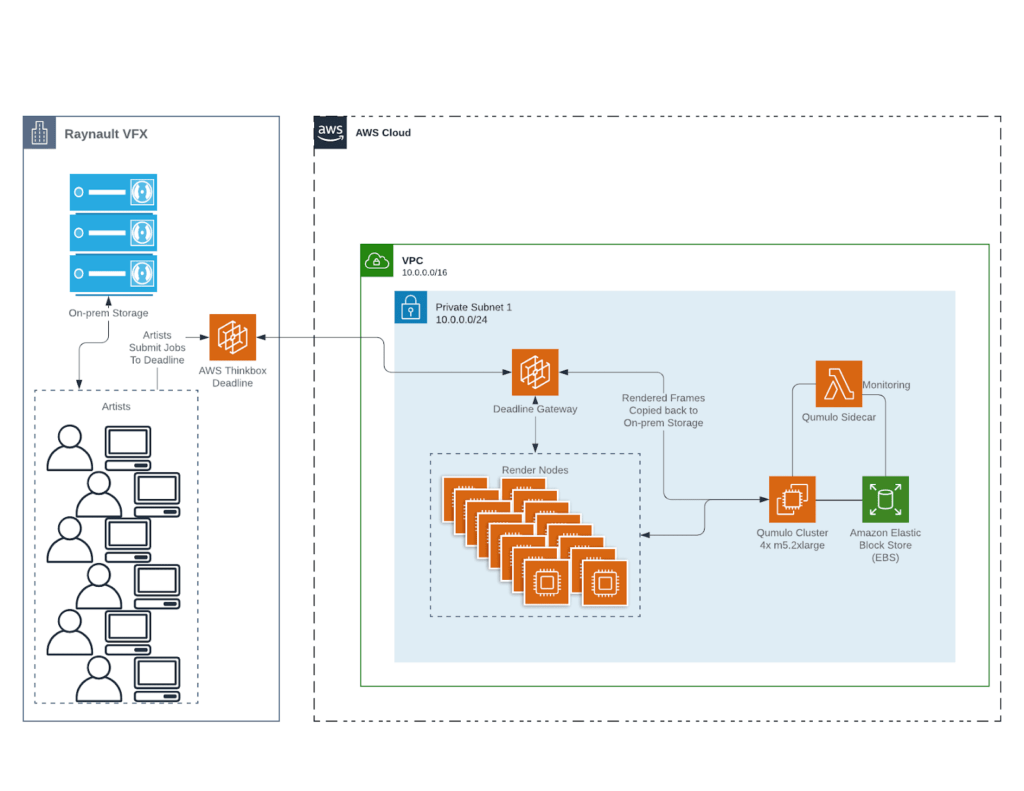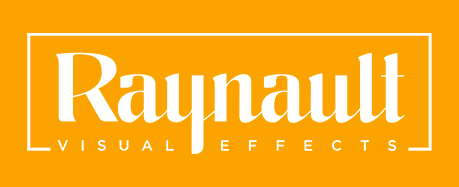Raynault VFX Builds Ultra-Fast Cloud Render Farm with AWS and Qumulo
Top visual effects studio Raynault easily meets tight deadlines by spinning up 1000+ rendering nodes within a few minutes
Raynault VFX is a premier visual effects studio located in Montreal, Canada. Well known for its high-quality visual special effects, the company’s many VFX film projects include feature films such as Aquaman, Watchmen, Maniac, 6 Underground, and Godzilla: King of the Monsters.
Raynault is devoted to using cutting-edge technology without incurring data center sprawl, so the IT team leverages hosted data centers for its compute-intensive rendering processes. When its original host could not spin up enough rendering nodes on time, Raynault decided to move its VFX rendering to the AWS Cloud, using AWS Thinkbox Deadline as the rendering service.
Originally, AWS Thinkbox Deadline maxed at 300 render nodes within Raynault’s compact time frame. Adding Qumulo Cloud Q more than tripled that number, enabling Raynault to spin up 1000+ render nodes within a few minutes. The innovative stack is capable of spinning up to three times that number, up to 3,000 nodes within minutes.
Top Business Benefits
- Accelerated rendering hits short deadlines. A VFX studio must meet client deadlines or risk impacting a client’s production schedule. Raynault moved its rendering farm to AWS and Qumulo Cloud Q, part of the Qumulo File Data Platform, so it could easily spin up thousands of nodes in a short timeframe.
- Heightened productivity. Bottlenecks in the previous rendering process threatened important deadlines and stressed creative, executives, and IT. By deploying the Qumulo File Data Platform on AWS, Raynault successfully rendered every job on time, which increased employee productivity and alleviated stress.
- Low cost improves ROI. Raynault expected a good return on investment by using Qumulo to enable large render farms. It achieved an even better ROI, thanks to Qumulo’s very reasonable costs and incredible customer support.
Mathieu Raynault founded Raynault VFX in 2011. From its early beginnings creating matte paintings in a loft, the company grew into a 35-person VFX company that serves studios like Disney.
Raynault previously contracted for hosted rendering with a hosted data center that built rendering farms on demand. Raynault maintained a minimum number of hosted render nodes. When they needed to cloud burst rendering projects to the data center, they ordered additional short-term bare metal nodes to serve the extra traffic.
However, scaling was a serious issue. The hosted data center could take as long as two weeks to install new nodes, but Raynault frequently needed the extra nodes in two hours or less.
Move to AWS at Scale
The company decided to move to AWS for cloud bursting rendering files. Typical asset upload sizes were over 2TB, including those generated by Isotropix Clarisse iFX, a fully interactive computer graphics toolset.
Raynault began the pilot project with AWS Thinkbox Deadline for rendering services. They needed a storage solution that could scale to over 300 render nodes so they turned to the scalability of Qumulo on AWS. Qumulo on AWS provides a seamless solution to work with AWS Thinkbox Deadline rendering to provide shared storage that scales beyond 1000 render nodes.
“The solution has allowed us to forge an emergency path to take very easily. Its massive rendering capability provides a level of security we didn’t have before. We know we can burst up pretty fast without any worries, which gives us and the artists peace of mind.”
Curtis Linstead, System Administrator at Raynault
Phased Approach Achieves Massive Scalability
The project took three phases to reach the massive number of rendering nodes that Raynault required. First, Thinkbox Deadline was tested. Then, Raynault deployed Qumulo Cloud Q on AWS for testing and saw performance improvements. In the second phase, Raynault deployed at scale to render frames with Cloud Q; this accelerated the rendering process.
In the third phase, the Raynault IT team built code that enabled them to better integrate Qumulo Cloud Q with AWS Thinkbox Deadline. This test spun up 1000+ render nodes within a few minutes.
“Since we deployed the Qumulo File Data Platform, the game changed. The platform lets us spin up one thousand computers within minutes, not days or weeks. This advantage is just the start. We are confident we can scale to three thousand nodes,” said Simon Ouellet, Pipeline Developer at Raynault.
To render data in the cloud, the company orders the extra nodes and syncs frames using Qumulo Cloud Q and AWS Thinkbox Deadline in a simple and straightforward operation. Once rendered, AWS Thinkbox Deadline Gateway copies the rendered frames back to Raynault’s on-prem storage. Ouellet added, “The cloud-based solution allows us the flexibility to switch over faster and provide the power that our artists need.”
Linstead recalled some very intense times when the company was experiencing rendering roadblocks. Several times, artists would launch a large render operation to run over a weekend, only to find out Monday morning that the operation failed. More than once, Ouellet spent his weekend in the office to make sure a render process was completed on time. That doesn’t happen anymore.
“We were hitting some really tight bottlenecks. AWS and Qumulo allow ease of mind for our production team, the tech team, and the artists themselves. This takes much stress off everyone involved,” commented Linstead.
Another benefit to Raynault is Qumulo’s customer service.
“If I had any questions, I would just post it in Slack, and the Qumulo team responded immediately. It was amazing. I have never had that kind of support anywhere else. Working with Qumulo is an amazing experience.”
Simon Ouellet
Qumulo support engineers worked closely with Raynault and AWS to build the massive rendering stack in AWS Thinkbox Deadline. Customer support remains just as proactive and responsive, with near-immediate responses at any time of the day or night.
“Qumulo lets us flip a switch to get the additional render power we need with no worries. The business outcome of fast rendering is that we know that if we hit a major crunch, we can flow through it smoothly and well, without any concerns.”
Simon Ouellet


Use Case
- Media
- Entertainment
- Creative production
Requirements:
- Accelerate rendering speeds
- Eliminate rendering bottlenecks
- Achieve good return on investment
Benefits:
- Accelerated rendering hits short deadlines: Raynault moved its rendering farm to AWS and Qumulo Cloud Q so it could easily spin up thousands of nodes in a short timeframe.
- Heightened productivity: By deploying the Qumulo File Data Platform on AWS, Raynault successfully rendered every job on time, which increased employee productivity and alleviated stress.
- Low cost improves ROI: Raynault achieved an even better ROI, thanks to Qumulo’s very reasonable costs and incredible customer support.
